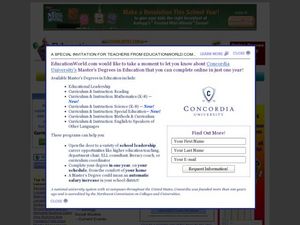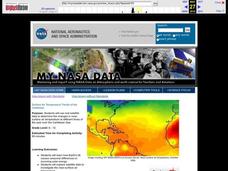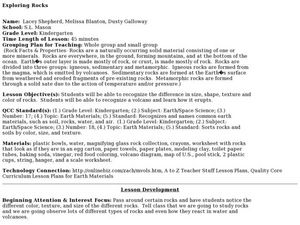Curated OER
"Little" Brothers Share Big Bond
Students listen to the story Little Brothers Share Big Bond and answer comprehension questions. In this lesson on acceptance, students use various areas of reading (vocabulary, fluency, comprehension) to promote compassion and an...
Curated OER
Mystery of the Alaskan Seamounts
Students study seamounts and the processes that form them. In this Gulf of Alaska lesson students interpret data and investigate a hypothesis.
Curated OER
Mass vs. Weight
Students explore physical science by conducting a measurement experiment. In this mass lesson plan, students identify the differences between mass and weight and define a list of other vocabulary terms. Students utilize electronic scales...
Curated OER
Mars 500: Would You Go?
In this Mars worksheet, students read a 7-paragraph article and respond to 8 graphic organizer, matching, and short answer questions. Vocabulary words and definitions are included.
Curated OER
Surface Air Temperature Trends of the Caribbean
Students investigate the seasonal changes to sea surface and near-surface air temperatures near the equator. They use actual satellite data to track and graph the differences in air and sea temperatures during different seasons in the...
Curated OER
Solar System
Second graders create planet mobiles in order to reinforce concepts such as planet size, position in relation to the sun, and planet names.
Curated OER
Mining Minerals
Students define the properties of minerals and their uses in their world. In this multi-lesson unit, students contribute actively to discussions of mineral mining, mining methods and mine safety. A role play lesson asks students to...
Curated OER
Using Radiosonde Data From a Weather Balloon Launch
Student use radiosonde data from a weather balloon launch to distinguish the characteristics of the lower atmosphere. They learn the layers of the atmosphere. They graph real atmospheric data.
Curated OER
Creating Station Models
Young scholars work in groups to interpret weather maps. They use latitude and longitude readings to complete a worksheet together and turn in the worksheet along with the maps and a rubric.
Alabama Learning Exchange
Coral Reefs
Study explore coral reefs. In this coral reef lesson, 4th graders examine the physical structure of coral reefs. Students consider why coral reefs need to be protected and ways to protect them.
Curated OER
Go Glacier Go!
Students create a model of a glacier and observe how it moves. In this landforms lesson, students learn what a glacier is, build a model glacier and observe how it moves in a manner that more closely resembles a liquid than a solid.
Curated OER
Earthquake Epicenters and Magnitudes
Learners work on a virtual earthquake to increase their understanding of seismograms, earthquake epicenters, Richter Magnitude and triangulation when finding the epicenter of an earthquake.
Curated OER
Plate Tectonic - Volcanoes Pre Lab
Second graders draw and compare parts of volcano. They investigate parts of a volcano and distinguish between magma and lava.
Curated OER
Exploring Rocks
Pupils collect and examine rocks. They record information about the rocks they have collected in their notebooks. They compare and contrast different rocks and complete a class chart at the end of the lesson.
Alabama Learning Exchange
Tornadoes
Students research tornadoes. For this weather lesson, students construct a KWL chart on tornadoes and view the video National Geographic-Tornadoes. Students discuss the facts they learned from the film and complete the KWL chart.
Curated OER
Student Exploration: Phases of the Moon
In this moon phase instructional activity, students complete 2 prior knowledge questions, then use the "Phase of the Moon Gizmo" to complete several activities, answering short answer questions when finished.
Curated OER
Meteorology Madness
Students probe the dynamic weather changes through several hands-0n activities in this seven lessons unit. The hydrologic cycle, clouds, atmosphere, air movement, fronts, and forecasting form the components presented in this unit.
Curated OER
Air and Water in the Environment
Second graders participate in a three part lesson in which they identify and describe forms of moisture in the environment. Part one of the lesson involves the three stages of the water cycle, part two focuses on creating humidity by...
Curated OER
What Does Plant Biology Teach Is About Climate?
Young scholars examine what factors influence climate. In this investigative lesson students compare the factors that influence climate and how they effect tree growth.
Curated OER
Earthquake Waves And Their Destructions
Learners investigate primary and secondary waves and how to measure the magnitude of waves. They discover how to find the epicenter of earthquakes. They examine why waves are more destructive in some areas than others through these...
Curated OER
Moon Phases
Middle schoolers engage in a study looking for the differences found during the cycle of one lunar month. They conduct research using a variety of resources. Then the information is used to construct a lunar calendar to observe daily...
Curated OER
Weather Predictions
Students record weather data and create a five day forecast. Students investigate the roles of meteorologists and identify symbols used on a weather map. After gathering weather data for a week, students will create a five day forecast...
Curated OER
Its Getting Thinner and Thinner
Pupils design posters on the ozone to be judged. They design a board game on the depletion of the ozone and list the layers of the atmosphere. They construct a collage of the atmosphere into layers according to the way temperature...
Curated OER
Metals, Nonmetals, Metalloids
Students recognize that metals, nonmetals, and metalloids have common attributes. They Identify physical and chemical properties. Students define ores and identify where ores can be found.
























